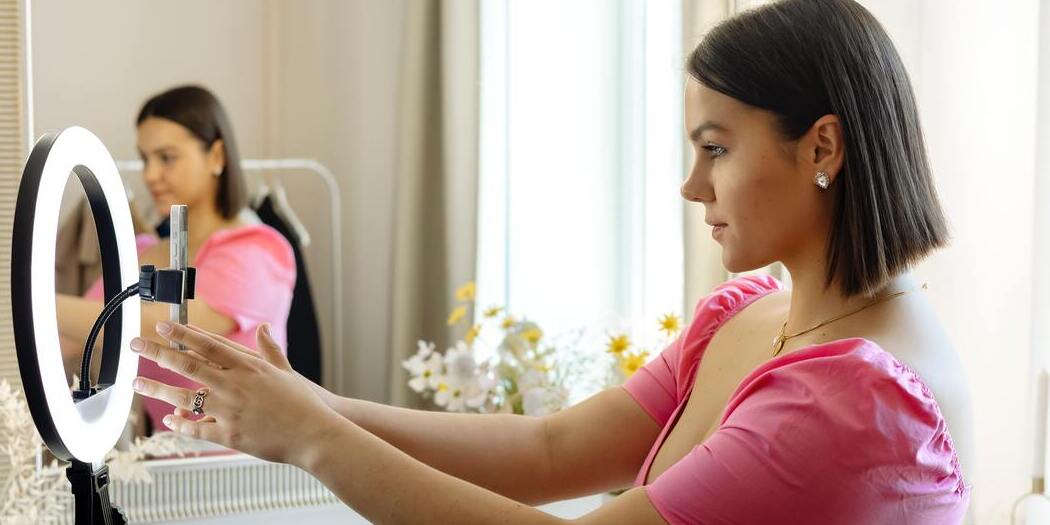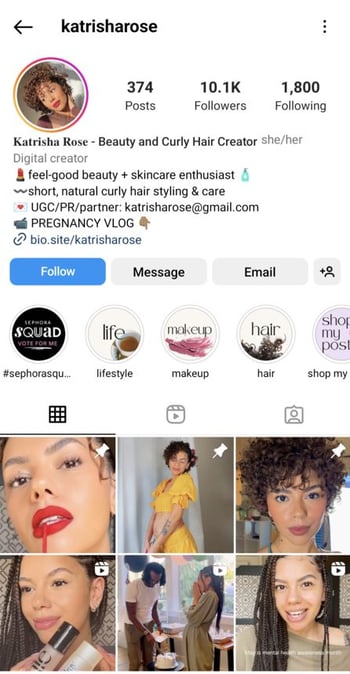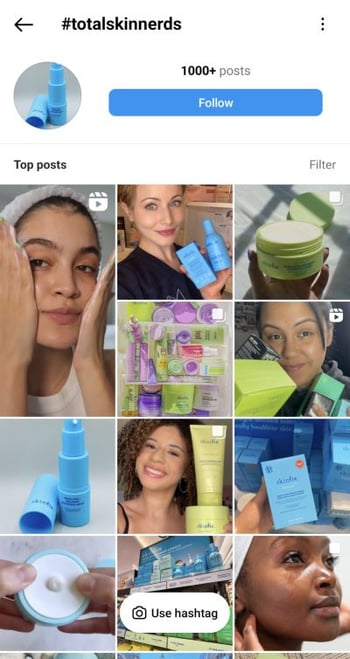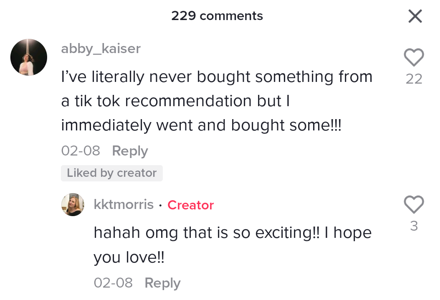12 Ways to Find Micro-Influencers for Your Brand
Not sure how to find micro-influencers without getting overwhelmed? Here are a dozen free and paid methods to find micro-influencers for your brand...
Driving results with micro-influencers requires different tactics than your typical influencer campaigns. Learn how to nail your micro-influencer strategy in this guide!


Have you nailed down your micro-influencer strategy?
Micro-influencer marketing is proven to drive engagement and scale UGC for consumer brands.
But to see real results and ROI, you need a dedicated micro-influencer strategy.
Because succeeding with "small" creators looks way different than typical influencer collaborations.
This expert micro-influencer marketing strategy guide covers everything from setting goals and finding content creators to tracking ROI and repurposing your UGC.
Micro-influencers are social media content creators with follower counts between 10,000 and 100,000. These creators are notable for their authenticity and higher engagement rates, resulting in meaningful collaborations and more reach for brands.
The definition of a micro-influencer varies wildly depending on who you ask, especially now that everyday consumers act as influencers regardless of their follower counts.

Micro-influencers represent a happy medium compared to nano or power-middle influencers. That's because their opinions and recommendations feel relatable but their micro-influencers' organic reach is still significant without being stifled by social algorithms.
Our recent analysis of 900+ influencer campaigns highlights how brands work with more micro-influencers than ever heading into 2025 and beyond.
More brands are making smaller creators the cornerstones of their influencer marketing strategies. Let's look at the benefits of micro-influencers and why collabs with small creators are so valauble.
It's super well-documented that micro-influencer engagement rates on TikTok and Instagram are typically higher than macro-influencers and celebrity creators.
In our own benchmark analysis of 500+ campaigns, we found that the average micro-influencer engagement rate on TikToks and Reels was nearly 12% for our creators.
Authentic content from micro-influencers drives interactions and gets more reach as a result.
See for yourself! Look at the most popular or viral product posts on your For You Page on TikTok. Chances are you'll see creators that fall into the "micro" range when it comes to their follower counts.
Micro-influencers tend to create more authentic content, full-stop.
They're more concerned with creating value for their audience because their account growth depends on it. As a result, micros tend to prioritize promoting products they genuinely love.
This creates a level of trust that's harder to achieve with bigger creators with content that feels more like a traditional commercial.
Piggybacking on our last point, social algorithms tend to rank and prioritize authentic content. Check out this example of a micro-influencer creator with 22k followers who earned over 1 million views on a single video and continues to get strong organic engagement on her promotional content.


In our experience, the raw and unfiltered nature of micro-influencer content is what helps it earn reach. Consumers want off-the-cuff opinions and real recommendations from actual consumers.
Getting your products in front of niche audiences is challenging with macro-influencers and celebrities. The bigger a creator's audience, the more "general" content they promote by default.
Contrast this with micro-influencers that build their entire followings and accounts based on niche audiences and products. For example, a creator may exclusively make content around a specific dietary restriction, medical condition or hair type.
Despite being "smaller," these creators have super enthusiastic audiences that hang onto every product recommendation they make. This makes them super valuable for brands, especially when launching a product to a new audience segment.
Any given micro-influencer collab is going to be significantly lower cost than a macro-influencer or celebrity endorsement.
The potential savings from working with smaller creators means that brands can scale their collabs to 100s or 1000s of creators to exponentially increase reach. The cost-effectiveness of micro-influencers is even greater when you promote content via UGC ads or other marketing channels.
To be clear, though: micro-influencers are not "cheap." Smaller creators absolutely deserve fair compensation and high-value collabs Again, we've found that the best influencer content out there comes from micros because of their authenticity and creativity.
Now it's time to get into the nitty-gritty! Below we've outlined five steps to help you build a results-driven micro-influencer strategy that you can scale.
No matter the size of your creators or campaigns, setting the right influencer marketing goals really determines whether you get the ROI you're looking for.
Whether it's pure brand awareness or content for ads, you need to define what you want to achieve with your micro-influencer marketing. Chances are you have overlapping goals and that's okay!
For reference, the top goal of nearly two-thirds of brands working with micro-influencers on our platform is brand awareness. Given the reach and scalability of smaller creators, this makes sense!
However, consider how getting repurposable UGC for influencer ads grew by 80% as a micro-influencer campaign goal this year. This highlights how brands are using small creators to fuel their paid and organic social strategies to increase performance across both.
No matter what your goals are, having an end game in mind will help you determine which metrics and KPIs to track. Not to mention how many creators you work with and where you find them.
Fact: the success of any creator campaign comes down to the creators you partner with.
Brands should find micro-influencers that match their ideal creator profile and target audience. At a minimum, your influencer partners should:
Below is an example of a micro-influencer that would be a perfect fit for natural or curly hair brands.

Source: @katrisharose
The thing is, figuring out how to find micro-influencers is one of the biggest challenges of micro-influencer marketing. For most brands, this means:
Most so-called micro-influencer platforms and search tools restrict brands to searching based on limited demographic data or follower counts. Meanwhile, digging through profiles to find creators and conduct outreach is a massive time sink.
Actually, all of these options for finding influencers are time-consuming. Especially for brands that want to collab with more than a handful of creators.
The good news? There’s no shortage of super-talented creators to partner with. If you don't want to do it all by hand, you need an actual micro-influencer platform to handle matchmaking.
For example, Statusphere uses 250+ first-party data points to match brands with relevant creators. Getting granular with your influencer targeting and segmentation means you can uncover creators across industries no matter how "niche" they might seem.
The more creators you collab with, the more your approach to influencer campaign management matters. Organization is everything as micro-influencer campaigns have so many moving pieces.
Many brands fall into the trap of micro-managing their micro-influencers. This results in a ton of time wasted and needless back-and-forth instead of more quality UGC.
Working with 100s or 1000s of creators doesn't mean being totally hands-off. However, your goal should be to reduce or eliminate as much manual, one-to-one communication as possible. Doing this while maintaining positive relationships with your creators is definitely a balancing act.
For example, do you want off-the-cuff videos or a polished photoshoot? Is there a specific setting or application of your products they should showcase?
This is where your influencer brief is make-or-break. Brands should be explicit about their expectations. By giving all of your creators the same specific set of directions, you can get content that ticks all the right boxes but doesn't require you to provide individual instructions.
However, micro-influencers often know best how to engage their audiences. So don’t restrict their creativity too much. Anything you can do to empower your creators to make better content is a plus.
Food for thought: influencer marketing ROI is relative to your goals.
That said, you need to keep an ongoing pulse on campaign performance. Doing so will inform what’s working, what’s not and where to improve.
What should you keep an eye on, though? Standard influencer metrics like engagement rates and @mentions are a solid starting point. Likewise, pay attention to how many pieces of user-generated content you’re earning. Branded hashtags for your campaign can help you track your creator posts.

Just remember that influencer KPIs aren’t always tied to hard numbers. For example, positive reviews and comments serve as powerful social proof despite not technically being pieces of content.

Source: @kktmorris
We’ve noticed that some campaigns need a couple of months to fine-tune themselves before they really take off. That said, influencer marketing doesn’t have to be a “wait and see” strategy. Granted you watch your priority metrics, you can (and should!) make changes related to your products, campaign targeting and other variables.
Making the most of your micro-influencer marketing strategy means strategically repurposing your UGC. Because positive results aren’t limited to the days (or even weeks) after your influencers post.
Not but a long shot!
The rise of ongoing, always-on influencer campaigns speaks for itself. There are so many opportunities to extend your campaign ROI and reach indefinitely as more and more influencer content rolls in. Some low-hanging opportunities include:
The high engagement of both Spark Ads on TikTok and Partnership Ads on Instagram (formerly Branded Content Ads) is notable. The fact that these ads feel like organic posts is exactly what makes them so valuable.

There’s a reason why more and more brands are using influencer ads to fuel their paid campaigns. When your best customers are your best billboards, featuring creators in ads long-term is a smart move.
Brands running micro-influencer campaigns consistently can't realistically do all of the above without the tools to do a lot of heavy lifting. Specifically, platforms that allow brands to find micro-influencers and manage their collabs in one place.
To wrap things up, below are four micro-influencer platforms that can help depending on your brand's bandwidth and goals.
Statusphere's micro-influencer platform is unique among our list of tools because our software doesn't involve manual creator discovery and outreach.
Manual outreach and combing through profiles yourself isn't an option for teams that want to scale their collabs to feature 100s or 1000s of creators. Instead, we use 250+ first-party data points to match brands and creators.
-1-1-2-1-1.png?width=700&height=429&name=Get-More-Content-4%20(1)-1-1-2-1-1.png)
Since our creators are vetted and collabs are pre-negotiated, brands can match with micro-influencers with confidence and save serious time in the process.
Statusphere's platform aligns with multiple micro-influencer marketing goals, too. Features like built-in content rights and UGC ad codes mean brands can seamlessly scale paid influencer campaigns without any back-and-forth. For brands that purely want brand awareness, our platform can also guarantee product delivery to 1000s of creators via product seeding.

Our platform's approach to targeting and segmentation eliminates the most time-consuming management tasks of working with micros. Not to mention removing the guesswork from finding micro-influencers who are relevant to your specific, niche audiences.
Aspire's platform offers brand dual discovery tools, including a dedicated influencer search engine and an influencer marketplace. Having multiple search tools is a bonus for brands that want to manually pick and reach out to creators individually.

Beyond searching by demographics and preferred platforms, brands can filter by follower count to find micro-influencers specifically. Aspire also offers social listening features to help brands identify existing creators who might be good candidates for collabs.
IZEA's influencer marketplace offers brands a way to quickly search for micro-influencers based on follower count, tags and demographic data. The platform promotes access to a database of "millions of influencers," meaning brands have endless options for potential candidates for influencer outreach. Beyond its software, IZEA also offers managed influencer campaigns.

Collabstr's influencer marketplace offers a place for brands to browse potential influencers for hire. Brands can search for micro-influencers across multiple social platforms based on follower count and see influencers' rates and unique qualities at a glance.

The platform's features serve as a sort of comprehensive job board to find influencers to reach out and negotiate with.
Brands across industries are winning with small creators right now.
Finding the right creators and how you execute your campaigns will make or break your micro-influencer strategy.
If you’re struggling to see the results or are spending way too much time on manual outreach and managing creators, Statusphere's software can help on both fronts.
Our scalable micro-influencer marketing platform can serve as your brand’s content engine. By matching brands with vetted micro-influencers without manual search, Statusphere offers a reliable way to get guaranteed micro-influencer content at scale. Our platform does all the heavy lifting from matchmaking and fulfillment to analytics and content rights management.
Want to learn more about how our platform works? Get in touch with our team to see how we can scale your micro-influencer marketing in a fraction of the time.
This article was first published in January 2017. It was last updated October 18, 2024.

A micro-influencer strategy describes how brands plan and manage collaborations with influencers who have between 10,000 and 100,000 social media followers.
An effective micro-influencer strategy finds a balance between partnering with a high volume of creators without spending too much time or energy on outreach, influencer management and negotiations.
Many brands have dedicated micro-influencer strategies and treat collabs with small creators differently than partnerships with macro-influencers or celebrities.
If you're reaching out to micro-influencers manually for collabs, we recommend the following:
Micro-influencers have between 10,000 and 100,00 followers.
However, there is no "correct" definition of a micro-influencer's follower count.
Many marketers refer to creators with fewer than 10,000 followers as nano-influencers while creators with more than 100,000 followers are considered "power-middle" influencers.
Micro-influencer marketing differs from traditional influencer marketing in a few distinct ways:
Not sure how to find micro-influencers without getting overwhelmed? Here are a dozen free and paid methods to find micro-influencers for your brand...
What is a micro-influencer? We dig into everything you need to know about micro-influencers including follower counts, engagement rates and tools to...
To put it simply, a micro-influencer is someone with a smaller following than notable influencers with millions of followers, but gets a ton of real...
Be the first to know about the latest tools, trends and strategies in influencer marketing for brands.